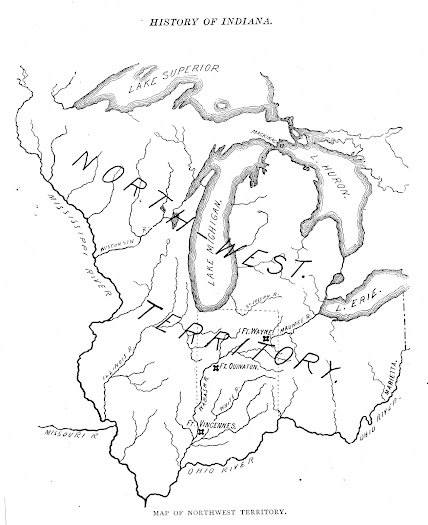__________
“You have submitted to him as your head
and superior.”
Elias Boudinot, advice to a
niece on marriage.
__________
 |
Control of this area is yet to be determined. |
IN 1784 the U.S. Navy included one ship, the Alliance. Congress sold the vessel in 1785. (2/212)
Cost-cutting was the name of the game.
*
JOHN C. MILLER notes that in
this era, “Thomas Jefferson operated on his plantation at Monticello a small
nail factory in which the ‘hands’ were Negro slave children, and George
Washington used slave girls to manufacture woolen, cotton and linen cloth.”
(300/147)
*
THE BARBARY PIRATES are a problem, according to the historian Benjamin Andrews. They had begun to “annoy our commerce” soon after we became an independent nation.
The Betsy was captured in 1784, next year the Maria, of Boston, and the Dauphin, of Philadelphia, and their crews of twenty-one men carried to a long and disgraceful captivity in Algiers.
The Dey’s bill for
these captives, held by him as slaves, was:
3
Captains at $6,000………………….$18,000
2
Mates at $4,000……………………....8,000
2
Passengers at $4,000…………………..8,000
14
Seamen at $1,400… …..……....……..19,600
_________
$53,600
For
custom, eleven per cent……………..5,896
_________
$59,496
Later, as Andrews puts
it, a single cruise lost us ten vessels to “these half-civilized peoples.” (2/328-329)
*
ELIAS BOUDINOT offers his niece the following advice in a letter:
Your duty to man, depends in the
performance of it, on the fulfillment of your duty to God. Your domestic
connections will call for your particular attention. Here you must not forget
that your husband should be the first object of it. By your union, you have
submitted to him as your head and superior. I know that it is a favorable
observation with many, that husband and wife are equal and there should be no
superiority. This is not true, but a dangerous error, from whence many
disagreeable consequences flow.
It is true, neither in theory or
practice. In point of merit, perhaps it may be strictly true, but in point of
order, God has thought proper to make it otherwise, and that for the punishment
of sin…
*
CALEB BINGHAM comes to Boston, and opens a school for girls.,
advertising that they will be taught writing, arithmetic, reading, spelling,
and English grammar. He wrote the famous Young Lady’s Accidence, for his
pupils, and explained to parents that “newspapers were to be introduced in the
school at the discretion of the master.” (226/97)
*
WITH the British slow to give up old posts in the Northwest, in 1784, James Monroe put forth a proposal to bolster the U.S. Army.
Monroe did everything
he could to promote the adoption of a measure calling for a force of 450 men
enlisted for three years, which David Howell of Rhode Island had introduced.
This modest scheme was so alarming that only three states approved and even the
Virginia delegation was inimical. (24/44)
When Monroe heard he might face danger from the Indians if he went to Oswego, he remarked that he would escape by either “a little fighting or a great deal of running.” (24/46)
At the opening of Congress, for the 1784-1785 session, “three weeks elapsed before a quorum was present; not a delegate appeared from New England during the first two weeks of the session. Understandably an atmosphere of melancholy settled over Congress.” (24/48)
When Monroe visited the Northwest, he learned that the settlers believed “the eastern states were not just indifferent but were in fact actively hostile” to their interests. Monroe deemed “a great part of the territory…miserably poor, especially that near Lakes Michigan & Erie & upon the Mississippi & the Illinois [which] consists of extensive plains which have not had from appearances & will not have a single bush on them for ages[.]” (24/53)
Rufus King remarked to Elbridge Gerry,
that every immigrant to the West was a resident lost forever to the East.
.jpg)
Iroquois war club.
Letchworth State Park, New York.
Land long controlled by the Iroquois.
Pictures from blogger's collection, unless noted otherwise.







